Essential Facts About Ohio Criminal Background Checks
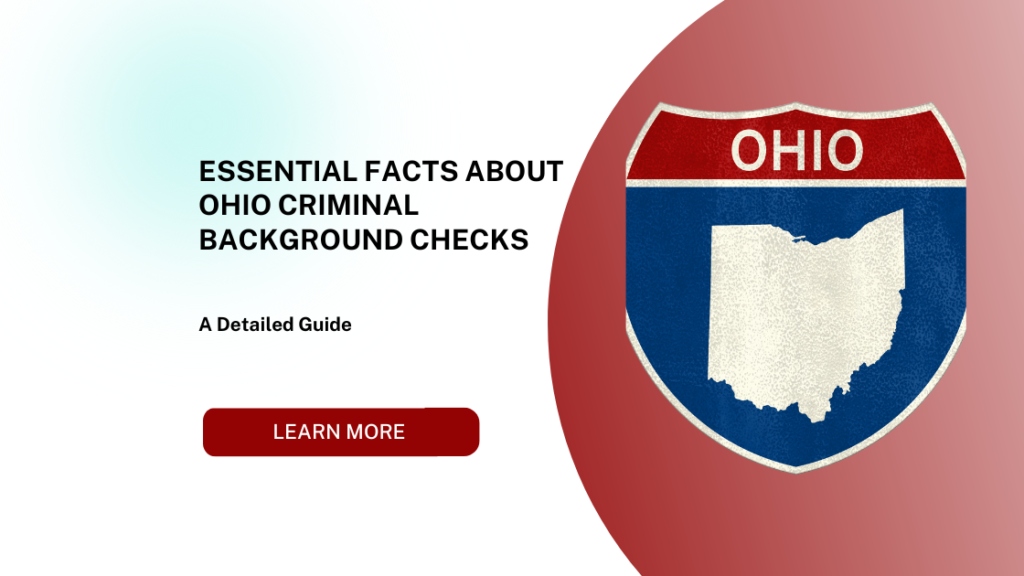
Introduction to Ohio Criminal Background Check
An Ohio criminal background check is a process used to obtain a detailed report on an individual’s criminal history within the state of Ohio. This type of check is crucial in many sectors, including employment, housing, and legal purposes, as it helps determine an individual’s eligibility for certain positions, rental properties, and legal clearances. The Ohio criminal background check plays a vital role in protecting employers, landlords, and the community by ensuring that individuals in key roles, such as employees, tenants, or licensees, have no prior criminal history that could pose a risk.
Types of Criminal Records Included in an Ohio Criminal Background Check
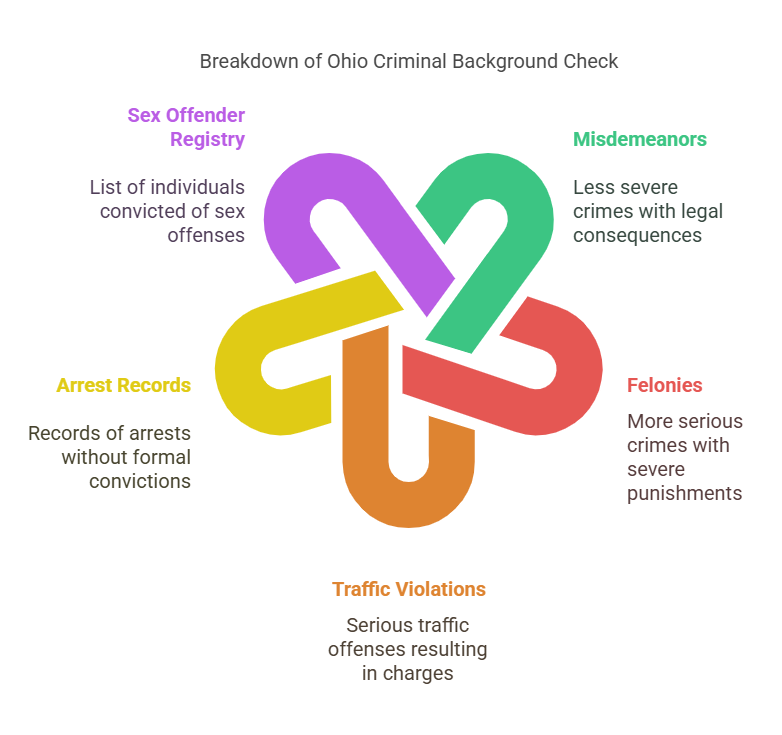
An Ohio criminal background check provides detailed information about an individual’s criminal history and may include several different types of criminal records. These records can reveal a wide range of offenses, including but not limited to:
1. Misdemeanors:
Misdemeanors are less severe crimes compared to felonies but still carry legal consequences. They are typically punishable by fines, probation, or short-term imprisonment (less than one year). Common misdemeanors include petty theft, simple assault, and public intoxication.
2. Felonies:
Felonies are more serious crimes and carry more severe punishments, including long-term imprisonment. Felonies in Ohio may involve violent crimes (such as murder, rape, and robbery), drug offenses, or white-collar crimes (like fraud). A felony conviction can have long-lasting consequences for an individual’s personal and professional life.
3. Traffic Violations:
Certain traffic violations can show up on a criminal background check if the offense was serious enough to result in criminal charges. These may include DUI/DWI (driving under the influence of alcohol or drugs), reckless driving, and driving with a suspended license.
4. Arrest Records:
An arrest record may be included, even if no formal conviction occurred. This record shows when and why an individual was arrested but does not necessarily indicate guilt. Arrest records are considered less definitive than conviction records.
5. Sex Offender Registry:
If an individual has been convicted of a sex offense, they may be listed on Ohio’s Sex Offender Registry. This information is critical for employment and housing applications, especially for jobs that involve working with vulnerable populations such as children or the elderly.
Role of the Ohio Bureau of Criminal Investigation (BCI)
In Ohio, criminal background checks are conducted primarily by the Ohio Bureau of Criminal Investigation (BCI). The BCI is a division within the Ohio Attorney General’s office and serves as the central repository for criminal records in the state. It maintains a comprehensive database that includes information from local law enforcement agencies, courts, and correctional institutions.
The BCI provides criminal background checks for both individuals and businesses. The data collected and maintained by the BCI is extensive, offering a detailed record of an individual’s criminal history, if any, in Ohio. To ensure accuracy and reliability, the BCI only includes information from officially recognized sources such as law enforcement agencies, state courts, and correctional facilities.
Key Types of Criminal Records and Their Impact in Ohio
The following table summarizes the different types of criminal records included in an Ohio criminal background check and their potential impact on individuals in Ohio:
| Type of Criminal Record | Description | Impact |
|---|---|---|
| Misdemeanors | Minor criminal offenses punishable by fines or short-term imprisonment. | May affect employment, housing, and licensing. |
| Felonies | Serious crimes punishable by long-term imprisonment or other severe penalties. | Major impact on job prospects and legal standing. |
| Traffic Violations | Criminal offenses related to the operation of a vehicle (e.g., DUI/DWI). | Can impact jobs requiring driving, insurance rates. |
| Arrest Records | Records of an individual’s arrests, regardless of conviction. | May affect reputation, employment, and housing. |
| Sex Offender Registry | List of individuals convicted of sexual offenses. | Significant impact on employment, housing, and reputation. |
Importance of Criminal Background Checks
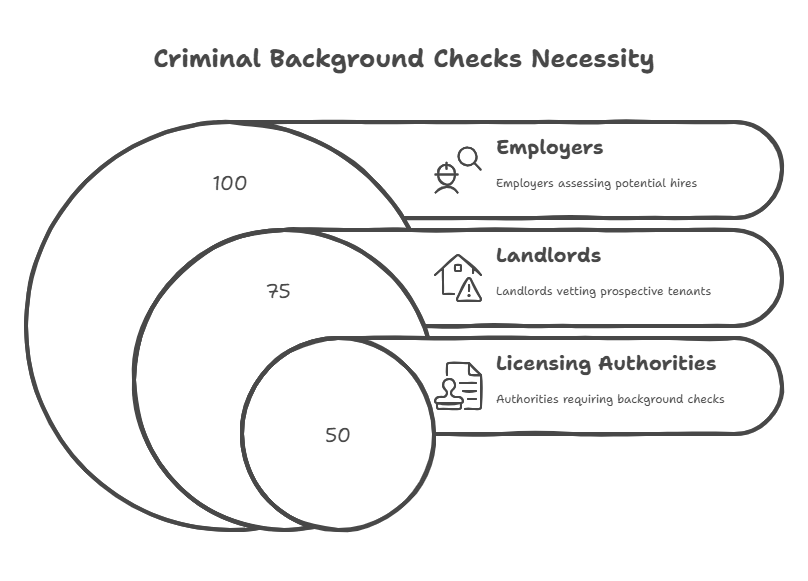
Criminal background checks in Ohio are crucial for various parties, including employers, landlords, and licensing authorities. Here’s why:
For Employers:
Employers use criminal background checks to assess a potential employee’s trustworthiness, character, and risk. Certain industries, such as healthcare, childcare, and education, may require background checks to ensure that employees do not have a history of violent crime or other offenses that could put others at risk. Employers are also looking to minimize their exposure to legal liability by ensuring that they hire individuals with a clean criminal history.
For Landlords:
Landlords often conduct criminal background checks on prospective tenants to ensure the safety and well-being of the property and other residents. A criminal background check can help landlords determine whether a potential tenant has any history of violent crime, drug offenses, or property damage. This is particularly important in high-risk neighborhoods or apartment complexes.
For Licensing Authorities:
Certain professional licensing boards and regulatory agencies require background checks to grant licenses to individuals in specific industries. For example, the Ohio State Medical Board may require a background check before granting a medical license, and the Ohio Department of Education may require one for teachers and school staff.
How to Obtain an Ohio Criminal Background Check: A Step-by-Step Guide
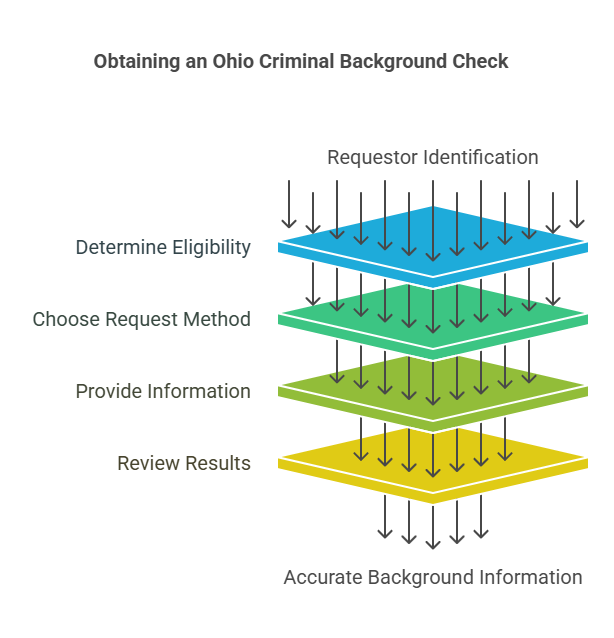
If you need to obtain an Ohio criminal background check, whether for employment, housing, or personal reasons, the process is relatively straightforward but requires careful attention to detail. Here’s a step-by-step guide to obtaining a criminal background check in Ohio.
Step 1: Understand Who Can Request an Ohio Criminal Background Check
In Ohio, criminal background checks can be requested by individuals, employers, landlords, and various other organizations. However, there are specific requirements based on who is making the request:
- Individuals: If you are seeking a background check on yourself (for personal use or to check for any errors), you can request it directly from the Ohio Bureau of Criminal Investigation (BCI).
- Employers: Employers in Ohio may request criminal background checks on prospective employees as part of the hiring process. In many cases, consent from the individual is required.
- Landlords: Landlords seeking to verify a tenant’s criminal history will generally need the tenant’s written permission to perform a criminal background check.
- Government Agencies and Licensing Authorities: Certain government entities and licensing boards also request criminal background checks for regulatory and legal purposes.
Step 2: Requesting an Ohio Criminal Background Check
There are several ways to request an Ohio criminal background check, and the method you choose will depend on the purpose of the check and the resources available to you. Below are the most common methods:
- Online Requests (via BCI)
The Ohio Bureau of Criminal Investigation (BCI) allows individuals and businesses to request criminal background checks online through the Ohio Attorney General’s website. This is often the most efficient and convenient method, as it can be done from anywhere with an internet connection.- How to Request: You will need to provide basic information about the individual being checked, such as their full name, date of birth, and any other necessary identifiers.
- Processing Time: Online requests usually take 1-3 business days to process, depending on the complexity of the request.
- In-Person Requests (via BCI)
You can also request a criminal background check in person by visiting the Ohio Bureau of Criminal Investigation (BCI) office. You will need to bring a valid ID, and payment for the fee (in the form of cash or check) to complete the process.- How to Request: Bring your completed application form (available online) and your photo ID to the BCI office.
- Processing Time: In-person requests may take several days to process.
- Mail-in Requests (via BCI)
If you are unable to make an online or in-person request, you can also submit a request by mail. This process involves filling out the appropriate forms and mailing them to the BCI’s office along with the necessary fee.- How to Request: Send the completed request form, proof of identification, and payment via check or money order to the address listed on the Ohio Attorney General’s website.
- Processing Time: Mail requests can take several weeks, depending on the volume of requests.
- Third-Party Services (such as ExactBackgroundChecks.com)
Another convenient option for individuals and businesses is to use a third-party service such as ExactBackgroundChecks.com. These platforms offer fast, reliable, and secure background check services, which can be particularly useful for employers and landlords.- How to Request: You can visit ExactBackgroundChecks.com, provide the necessary details about the individual, and request the background check online.
- Processing Time: These services typically offer faster turnaround times (often within 24 hours) compared to government-run services.
Step 3: Provide the Necessary Information and Consent
Whether you’re requesting the background check for yourself, for a potential employee, or for a prospective tenant, certain information is necessary to complete the request. Additionally, written consent from the individual being screened is often required, especially when the check is being conducted by an employer or landlord.
- Information Needed: Full name, date of birth, address, social security number (if applicable), and any previous names or aliases.
- Consent: For employers and landlords, written consent from the individual being checked is typically required to comply with legal regulations such as the Fair Credit Reporting Act (FCRA).
Step 4: Review the Criminal Background Check Results
Once the Ohio criminal background check is completed, the results will be provided to the requesting party (individual, employer, or landlord). These results typically include detailed information about the individual’s criminal history, including arrest records, misdemeanor and felony convictions, traffic violations, and, in some cases, status as a registered sex offender.
It is important to review the results carefully to ensure the accuracy of the information. If there are any discrepancies or errors, you may request a review or dispute process.
Costs Involved in Obtaining an Ohio Criminal Background Check
The fees for an Ohio criminal background check can vary depending on the method of request and the type of check you are conducting. Below is a general breakdown of the costs associated with obtaining a criminal background check in Ohio:
| Request Method | Fee | Processing Time |
|---|---|---|
| Online Request (BCI) | Approximately $22 for an individual check | 1-3 business days |
| In-Person Request (BCI) | $22 per check | Several days |
| Mail-in Request (BCI) | $22 plus postage | Several weeks |
| Third-Party Services | Varies (typically $20-$50) | 24-48 hours |
In addition to the base fee, additional costs may apply if you need expedited processing or special services such as fingerprinting.
Who Can Request an Ohio Criminal Background Check?
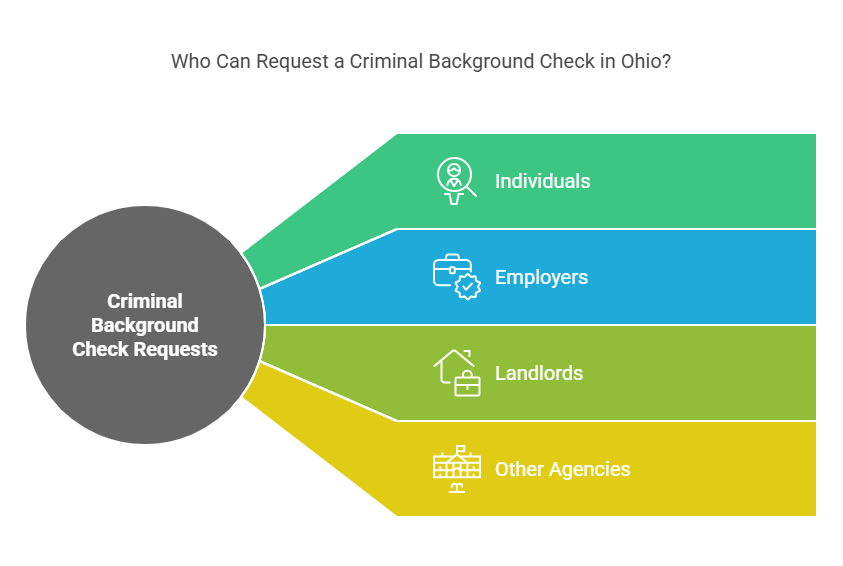
- Individuals: Any Ohio resident can request their own criminal background check for personal use or to ensure that their records are correct.
- Employers: Employers can request criminal background checks as part of the hiring process, with the individual’s consent.
- Landlords: Landlords may also request criminal background checks for tenants, ensuring the safety of their property and other tenants.
- Other Agencies: Certain government agencies, licensing boards, and professional associations may require criminal background checks for licensing or certification purposes.
Legal Aspects of Ohio Criminal Background Checks
When conducting criminal background checks in Ohio, there are several legal considerations and guidelines that must be followed. Understanding these legal aspects is essential to ensure compliance with state and federal laws and to protect the rights of individuals being screened.
Fair Credit Reporting Act (FCRA)
The Fair Credit Reporting Act (FCRA) is a federal law that governs the use of consumer reports, including criminal background checks, by employers, landlords, and other parties. Under the FCRA, the following rules apply to criminal background checks:
- Consent: Employers and landlords must obtain written consent from the individual before conducting a criminal background check.
- Notification: If an employer decides to take an adverse action (such as not hiring someone) based on the results of a criminal background check, they must provide the individual with a copy of the report and a notice of their rights under the FCRA.
- Disputing Errors: If the individual believes there is an error in the report, they can dispute the findings with the reporting agency, and the agency is required to investigate the claim.
- Adverse Action: Employers or landlords must follow a specific procedure before denying employment or housing based on a criminal background check, which includes providing a copy of the report and giving the person a chance to dispute it.
Ohio-Specific Laws
In Ohio, there are additional regulations that impact how criminal background checks are used, especially in employment and housing. Some key laws include:
- Ohio Employment Discrimination Law: Ohio law prohibits employers from discriminating against individuals based on race, color, national origin, gender, or other protected categories when making decisions about employment, including using criminal background information. Employers must consider the nature of the offense and how it relates to the job before making decisions based on criminal history.
- Ban the Box: Ohio law includes provisions for “Ban the Box”, which limits the ability of employers to ask about criminal history on job applications. Employers can still conduct criminal background checks later in the hiring process, but they cannot make initial hiring decisions solely based on criminal records.
- Expungement: Individuals in Ohio who have been convicted of certain offenses may be eligible to have their criminal records sealed or expunged. If a record is expunged, it will not appear in background checks, and the individual can legally state they have not been convicted of a crime.
Limitations on the Use of Criminal Background Checks
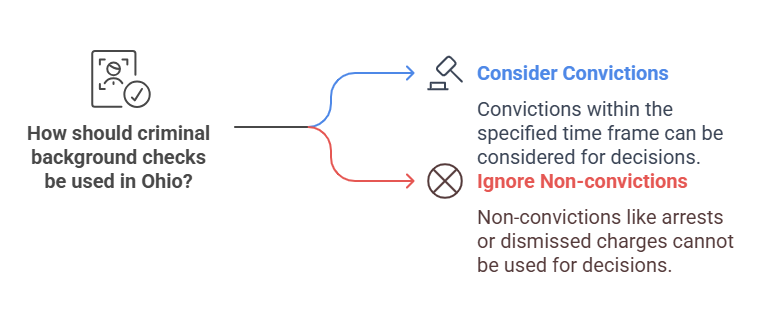
There are also certain limitations on the use of criminal background checks in Ohio. These include:
- Time Limits: Ohio law allows for the consideration of criminal records only within certain time frames. Employers and landlords can only consider convictions within a certain period (usually 7 to 10 years) unless the conviction is considered severe or recent.
- Non-conviction Records: In Ohio, individuals can only be penalized for criminal convictions, not arrests or charges that did not result in a conviction. Non-conviction records, such as arrests or dismissed charges, generally cannot be used to make decisions regarding employment or housing.
Frequently Asked Questions (FAQs)
What is an Ohio criminal background check?
It's a process to obtain a detailed report of an individual's criminal history within Ohio, used for employment, housing, and legal purposes.
What types of criminal records are included in an Ohio criminal background check?
It includes misdemeanors, felonies, traffic violations (like DUI/DWI), arrest records, and sex offender registry status.
How do I obtain an Ohio criminal background check?
You can request it online, in-person, or by mail through the Ohio Bureau of Criminal Investigation (BCI), or use third-party services like ExactBackgroundChecks.com.
What are the legal considerations for Ohio criminal background checks?
Considerations include compliance with the Fair Credit Reporting Act (FCRA), Ohio-specific laws like "Ban the Box," expungement rules, and limitations on using non-conviction records.
What are the costs and processing times for an Ohio criminal background check?
Costs vary (approximately $22 for BCI checks, $20-$50 for third-party services), and processing times range from 1-3 business days for online BCI requests to several weeks for mail-in requests.
Conclusion
Criminal background checks are an essential tool for maintaining safety and fairness in Ohio, whether you’re an employer screening potential hires, a landlord vetting tenants, or an individual checking your own record. The process for obtaining a criminal background check is relatively straightforward, but understanding the legal aspects, consent requirements, and timelines is vital to ensure compliance with state and federal laws.
Employers, landlords, and individuals should also be aware of the limitations and protections surrounding the use of criminal records, including the timeframes for reporting, how to dispute errors, and the rights of individuals under Ohio law. Using accurate and compliant background check services, such as ExactBackgroundChecks ensures that you’re following the correct procedures and receiving reliable information.
By adhering to these guidelines, individuals and organizations can make informed decisions that contribute to a safer and more transparent environment for everyone involved.



